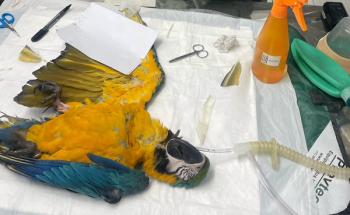
Texas slaps PetMed Express with lawsuit
Austin, Texas- As PetMed Express settles a slew of administrative battles with state pharmacy boards across the country, Texas leaders strike with litigation to ban company sales in the state and fine the online pet pharmacy $1,000 per day for each day it allegedly sold prescription drugs illegally to Texas consumers.
Austin, Texas- As PetMed Express settles a slew of administrative battles with state pharmacy boards across the country, Texas leaders strike with litigation to ban company sales in the state and fine the online pet pharmacy $1,000 per day for each day it allegedly sold prescription drugs illegally to Texas consumers.
It's the first time a state agency has taken the nation's largest Internet pet drug retailer to court. Along with fines and an injunction, the lawsuit includes at least two criminal acts - federal and misdemeanor crimes involving the illegal sale of prescription drugs (see Fact Box, p.36).
"We're serious about this," says Lee Mathews, attorney for the Texas Board of Veterinary Medical Examiners, which joins the Texas Board of Pharmacy as a plaintiff. "Mostly this is a civil action, but there are criminal sanctions that could apply should the judge decide that."
PetMed Express attorneys deny the charges. In a recorded message to DVM Newsmagazine, company Chief Executive Officer Menderes Akdag says, "We are still a licensed pharmacy in Texas and we are confident in our compliance with the law." He did not return phone calls to elaborate.
Making a dent
In the past two years, pharmacy boards in states from Missouri to Florida have found the company and its counterpart, Savemax Pharmacy, guilty of selling prescriptions without proper authorization from a veterinarian with a direct client/patient relationship, but their punishments routinely consist of license probations and fines tallying no more than $40,000 apiece.
Fact Box
That's not a lot considering PetMed Express' latest U.S. Securities and Exchange Commission (SEC) report reveals the company's gross profits increased 261 percent in fiscal year 2002, totaling almost $9.5 million while sales increased by 220 percent.
Critics suggest the Pomona Beach, Fla.-based company factors administrative fines into the cost of doing business, often ignoring them. Florida's pharmacy board reprimanded the company for nearly identical offenses twice.
"Considering this company's record, we feel like we need something a little stronger than an administrative hearing," Mathews says. "We've heard so much about their previous violations and ignoring administrative orders. We hope this lawsuit gets their attention."
But at $1,000 per day for each instance, it isn't publicly known what the lawsuit's fine could amount to, should a judge impose it. Texas officials won't release the number of complaints on record or their allegations, citing confidentiality requirements for ongoing cases.
"All that will come out as the case proceeds," Mathews says.
But considering the company's SEC filings report, most of PetMed Express' income comes from customers in seven states, one of which is Texas, an injunction likely carries the most weight.
"If we should lose our pharmacy license in one or more of these states, our financial condition and results of operations would be materially adversely affected," the report claims.
Long list of complaints
Texas officials might be tightlipped regarding specific cases in their arsenal, but Chris Copeland, general counsel to the Texas Veterinary Medical Association (TVMA) says he's received hundreds of calls from veterinarians alleging PetMed Express sells prescription drugs to their clients without proper authorization.
When a DVM refuses to approve a prescription, he says PetMed Express' staff veterinarians fill the order anyway. The company refers to this as their "alternate veterinarian program," and its now defunct, PetMed Express officials claim.
"Our alternate veterinarian program was discontinued and was under investigation by the Florida Board of Pharmacy and Florida Agency for Health Care Administration, and by various other state's pharmacy boards," reads its SEC report.
High-priced discipline
PetMed Express faces charges or has settled with pharmacy boards in Florida, Alabama, Missouri, New Mexico, Pennsylvania, Ohio and Louisiana regarding its alternative program. The U.S. Environmental Protection Agency recently fined the company $100,000 for selling Australian products with metric system dosages to U.S. consumers. The U.S. Food and Drug Administration is rumored to be investigating as well.
Despite the number of cases, none have turned into lawsuits. Government officials often take the administrative route holding disciplinary hearings because the results are less risky. Tackling a company such as PetMed Express in the courts not only could result in an unfavorable outcome, it can be expensive. Rulings are often appealed at a high cost to state agencies in terms of time and legal fees.
But Texas officials aren't worried about the cost as much as they want to see consumers protected from PetMed Express' alleged unlawful business practices, says Elbert Hutchins, Texas Veterinary Medical Association executive director.
"I don't have much patience with people wringing their hands and talking about how much it's going to cost," Hutchins says. "If PetMed Express is bigger than the state of Texas then we're in trouble."
Newsletter
From exam room tips to practice management insights, get trusted veterinary news delivered straight to your inbox—subscribe to dvm360.






